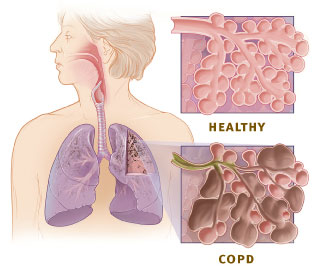The exact cause of Alzheimer's Disease is not known; it proposed that the disease may be due to progressive atherosclerosis of blood vessels resulting in shrinkage of brain matter, stroke related, decreased neurotransmitter like acetylcholine and deposit of amyloid-β protein in the brain cells.
It is loosely called as dementia, but is a type of dementia with failure of intelligence and memory; as well as loss of implementation functions.
These changes are due to the progressive dysfunction and death of nerve cells that are responsible for the storage and processing of information.
In brain scans of various types, it has been seen that the region of brain such as temporo-parietal lobe, frontal cortex, brain stem and hippocampus; those are responsible for memory processing and appropriate action are shrunk in Alzheimer's Disease.
Till now, no effective treatment has come up. Some stress is given on brain exercise, physical exercise, change of lifestyle, smoking cessation, control of blood sugar in diabetics and balanced diet etc..
Among the upcoming researches;
- increase in level of homocysteine, an intermediate metabolite of protein methionine is blamed as cause of the disease. It has a direct deleterious effect on brain cells, causes atherosclerosis of blood vessels, promotes amyloid B protein deposit in cells and increases degradation of the neurotransmitter acetylcholine by up-regulating the activity of acetylcholinesterase especially, Butyrylcholinesterase.
1. Higher intake of Folic acid and Vitamin B6 & B12 has been shown to be effective in arresting progression and preventing Alzheimer's disease by decreasing the level of homocysteine.
In the research, they have used 20 mg. of Vitamin B6, whereas the recommended daily dose is 1.4mg. in male and 1.2mg. in female; 500mcg. of vitamin B12, whereas the recommended daily dose is 1.5mcg.; and 800mcg of folic acid whereas the recommended daily dose is 200mcg.
There is fear that such high dose may also have deleterious effect on human health. This needs to be addressed in further researches that are in the process.
Therefore, now only recommendation is to take nutritious diet to get good amount of B group of vitamins because it may not be safe to supplement vitamin in the range (Higher than the daily recommended dose) that can effectively work for Alzheimer's.
2. Vitamin E, vitamin C, Omega-3 fatty acids and Ginkgo may also help through their antioxidant property. Vitamin E is also not to be consumed for longer period without opinion of the physician.
3. Roshni George and Donald Graves, scientists at University of California - Santa Barbara, found that two compounds in cinnamon - cinnamaldehyde and epicatechin - show some promise in the effort to fight the disease.
According to George and Graves,the compounds have been shown to prevent the development of the filamentous"tangles" found in the brain cells that characterise Alzheimer's.
3. Roshni George and Donald Graves, scientists at University of California - Santa Barbara, found that two compounds in cinnamon - cinnamaldehyde and epicatechin - show some promise in the effort to fight the disease.
According to George and Graves,the compounds have been shown to prevent the development of the filamentous"tangles" found in the brain cells that characterise Alzheimer's.
- Second interesting research is on a cancer drug that dissolves the deposited bad protein (Amyloid Beta) in the brain cells or neurons. It has been seen in mice to be effective. The research was on mouse model carried out in University of Pittsburgh Graduate School of Public Health.
Still, it has not been tried in human and some other researchers have given opinion to contrary. However, more trials are coming up with this drug that may clear the position.
...
Click here to Subscribe news feed from "Clinicianonnet; so that you do not miss out anything that can be valuable to you !!
...







